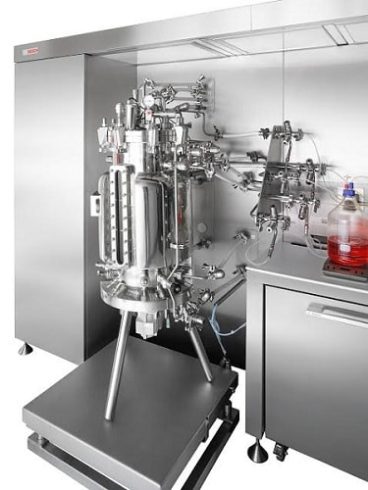Bosch has launched a new pilot fermenter for the cultivation of active pharmaceutical ingredients (APIs) on laboratory and pilot scale. “In the pharmaceutical industry, the manufacture of complex compounds using biotechnological methods continues to grow in importance.
Whether the desired substance is an insulin preparation or a medication for targeted cancer therapy –our bioprocessing systems deliver optimum product quality and excellent process results,” says Dr. John Medina, sales director at the Bosch subsidiary Pharmatec. “With the new pilot fermenter, Bosch has rolled out a modular, fully automatic system that is suitable for R&D applications, clinical studies in the lab, and industrial production of small batches.” The pilot fermenter was presented at interpack 2017 in Duesseldorf.
Modular process system for diverse cell cultures When it comes to designing fermentation systems, the goal is to create optimal growing conditions for microorganisms such as cells and bacteria. At the same time, these systems have to meet the strict cGMP regulation standards for the pharmaceutical industry. Bosch’s highly versatile pilot fermenter satisfies the specific requirements for the production of APIs, and for a diverse range of applications.
“Thanks to its modular design, the bioreactor is well suited to various cultivation processes and cell cultures. Interchangeable mixing and dosing technologies ensure that the optimal fermentation process can be found to match the customers’ needs,” explains Medina. Depending on the selected mixer, the fermenter can process batch sizes from eight or 13 liters, up to 50 liters. In addition, reactor sizes for 100 and 200 liters are available for pilot and small industrial batches. Bosch has complemented its existing portfolio of fermentation devices, which had previously offered production volumes ranging from 500 to 5,000 liters.
Interchangeable mixing technologies Depending on requirements, the system can be equipped with one of several interchangeable mixing elements, designed for different cell types and process controls. The mixer regulates the inflow of liquids or gases needed for cell cultivation. Sensitive cells require the use of gentler technologies like the air lift module, while more robust cells can be stirred mechanically.
The feeding of process media takes place fully automatically. As an alternative to the installed peristaltic pumps and two additional pumps in the periphery, at the show Bosch highlighted a separate module that offers high-precision dosing for liquid media with four syringe pumps. Further, the system periphery can be expanded to include additional peristaltic pumps, so that additional process fluids can be dosed.
Continuous process controls Since the pilot fermenter is equipped with a gentle rotary pump and a second reactor vessel, it supports batch and fed-batch processes, as well as perfusion and continuous processing. Whereas the cell culture is essentially left to itself in batch processes, fed-batch processes continue to supply nutrient solutions during fermentation, resulting in higher cell density and product yield. In turn, perfusion is suited for the highest possible cell density: the fermenter is continuously supplied with fresh media, and equal amounts of waste media are extracted from the cultivation process by the system’s two hollow fiber modules.
In addition, the system is built as a package unit and the integrated wall allows the clear separation of technical section from operational area. The fermenter is designed for easy cleaning and sterilization (CIP/SIP). Its integrated periphery includes a steam generator, exhaust air cooler, and a heating/cooling device for the bioreactor. Depending on the task-specific requirements, up to four interchangeable process sensors are available. This concept enables quick installation at available spaces with limited media availability and quick changeover. Further, in terms of subsequent downstream processes and the formulation of the final injectable liquid, Bosch offers comprehensive solutions that can be seamlessly combined with other Bosch products for the filling and packaging of liquid pharmaceuticals.
Contact for readers:
Klaus Schreiber
Phone: +49 351 28278-833
Contact for members of the press:
Nicole König
Phone: +49 7951 402-648
Based in Waiblingen near Stuttgart, Germany, and employing 6,300 associates, the Bosch Packaging Technology division is one of the leading suppliers of process and packaging technology. At over 30 locations in more than 15 countries worldwide, a highly-qualified workforce develops and produces complete solutions for the pharmaceuticals, food, and confectionery industries. These solutions are complemented by a comprehensive after-sales service portfolio. A global service and sales network provides customers with local points of contact. More information is available online at www.boschpackaging.com
The Bosch Group is a leading global supplier of technology and services. It employs roughly 390,000 associates worldwide (as of December 31, 2016). The company generated sales of 73.1 billion euros in 2016. Its operations are divided into four business sectors: Mobility Solutions, Industrial Technology, Consumer Goods, and Energy and Building Technology. As a leading IoT company, Bosch offers innovative solutions for smart homes, smart cities,
connected mobility, and connected manufacturing. It uses its expertise in sensor technology, software, and services, as well as its own IoT cloud, to offer its customers connected, crossdomain solutions from a single source. The Bosch Group’s strategic objective is to deliver innovations for a connected life. Bosch improves quality of life worldwide with products and services that are innovative and spark enthusiasm. In short, Bosch creates technology that is
“Invented for life.” The Bosch Group comprises Robert Bosch GmbH and its roughly 440 subsidiaries and regional companies in some 60 countries. Including sales and service partners, Bosch’s global manufacturing and sales network covers nearly every country in the world. The basis for the company’s future growth is its innovative strength. At 120 locations across the globe, Bosch employs some 59,000 associates in research and development.
Additional information is available online at www.bosch.com, www.iot.bosch.com, www.boschpress.com, www.twitter.com/BoschPresse.

















![Sirio Launches Global Research Institute for Longevity Studies [SIA]](https://www.worldpharmatoday.com/wp-content/uploads/2019/09/Sirio-218x150.jpg)


